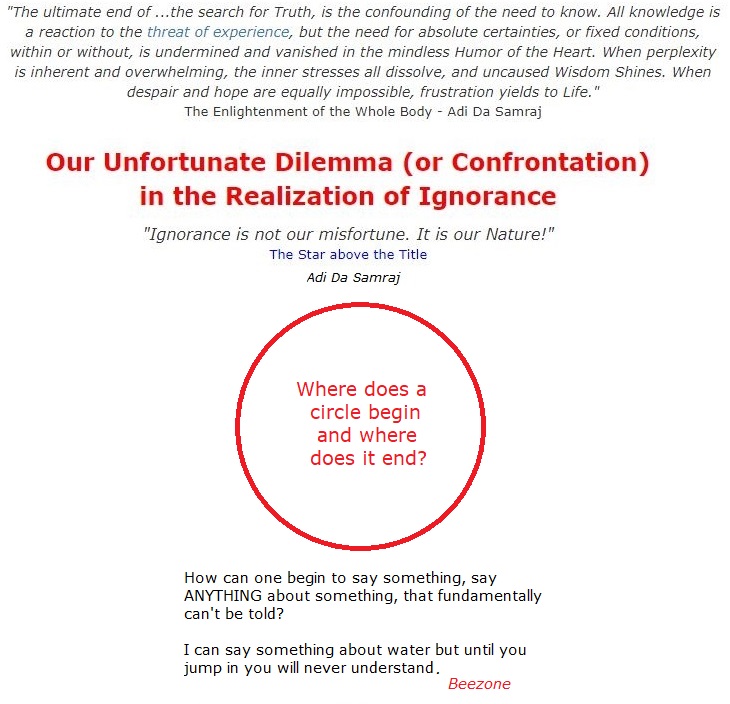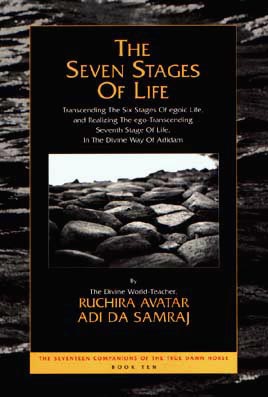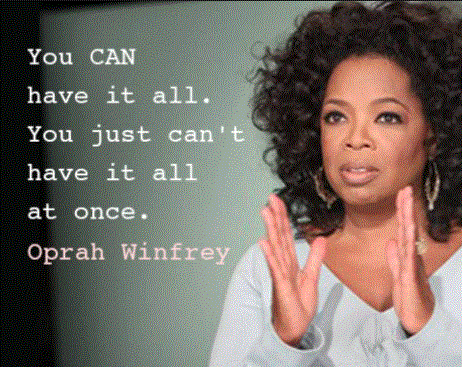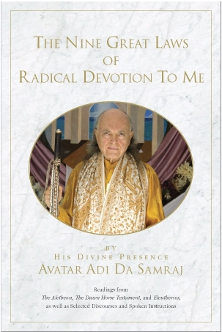‘Obedience’ in the Teachings of Adi Da Samraj
Preface

‘Obedience’ in the Teachings of Adi Da Samraj

![]() was doing some work on the ‘Poetry Wars‘ at Naropa Institute and revisiting an old Harper’s article by Peter Marin entitled, ‘Spiritual Obedience.’ The article was interesting because it addressed an issue Peter’s friend was having of submitting one’s will – and life – to a spiritual community and master. On the first page, his friend writes a letter “scrawled unevenly on lined yellow paper”
was doing some work on the ‘Poetry Wars‘ at Naropa Institute and revisiting an old Harper’s article by Peter Marin entitled, ‘Spiritual Obedience.’ The article was interesting because it addressed an issue Peter’s friend was having of submitting one’s will – and life – to a spiritual community and master. On the first page, his friend writes a letter “scrawled unevenly on lined yellow paper”
“I’ve lived very much the lifestyle of 1984. Or of Mao’s China – or of Hitler’s Germany. Imagine for a moment a situation where every single moment of your day is programmed. You begin with exercise, then meditation, then a communal meal. Then the service (the work each member does). As the Director of the House in which I lived and the director of the clinic, it was my job daily to give the requisite pep talks or Satsangs to the staff. You work six days a week, nine to six – then come home to dinner and then go to two hours of spiritual discourse, then meditate. There is no leisure. It was always a group consciousness. You discuss nothing that isn’t directly related to “the knowledge.” You are censured if you discuss any topics of the world. And, of course, there is always the constant focus on the spiritual leader.”
Does this sound familiar? I think this description would be fuel for many anti-cult websites talking about the evils of brainwashing and mind control. Have you seen the Netflix documentary on Rajneesh community, ‘Wild Wild Wild Country‘? Since the topic of cults and brainwashing has always been in the dialogue of ‘enlightenment’, I thought it would be useful to study Adi Da’s teaching on ‘obedience’ and take a close look at what he means and what his editors write on the subject, “Sat-Guru-Da knows what we need. We do not.” (Surrender Through Obedience, The Free Daist, Vol, 1, No. 1, 1989.)
“When Harper’s magazine ran an article, “Spiritual Obedience,” which gave the incident national coverage. The writer of the piece, Peter Marin, professed horror not at the shenanigans but that later neither Trungpa nor his disciples would admit to his having done anything wrong. Some students, so Marin reported, converted the debacle into a teaching or morality play in which the unclad Merwin and Naone were the naked Adam and Eve (and by inference Trungpa must be God expelling them from Eden).
Jeffrey Paine, Re-Enchantment on the Naropa’s Poetry Wars

 hat is the correct understanding of the term ‘obedience’ in the teachings of Adi Da Samraj?
hat is the correct understanding of the term ‘obedience’ in the teachings of Adi Da Samraj?
When studying Adi Da and how his editors use the term ‘obedience’ I can understand how there can be some confusion, reaction, and misinterpretation. This, of course, is not a surprise since Adi Da and what he teachings is based-in “a process of supreme Mystery, ultimate Paradox”.
(Introduction – ‘My Final Work of Divine Indifference)
Terms such as surrender, submission, obedience, and letting go are used interchangeably in all religions. In Islam it is stated that God will only accept surrender “Surely, the only religion Allah will accept is (surrender) to His Will.” [Holy Quran 3:19]. In Christian theology, it is understood as, “Obedience is an aspect of our faith that comes from our submission, surrender, and compliance to His will.” In Buddhism, the teachings of non-attachment require letting go which is a form of surrender and allowing what IS. These terms are interchangeable as they related to a different emphasis on the same theme.
In The Message of Adidam, an essay written by a devotee in order to give devotees an Aletheon-time understanding of the Reality-Way of Adidam and Bhagavan Adi Da’s Message to the world, it is written: “Adidam is founded in Avatar Adi Da Himself and demonstrated through right relationship to Him or utter respect for, and obedience to, the Source and Person of Self-Evident Truth.” Adi Da appears to be saying what other religions are. “That he/she shall enter into a bond of brotherhood with this humble servant of God, pledging obedience to me in everything good for the sake of God, and remain faithful to it until the day of his/her death.” (Claims of the Promised Messiah – The 10th condition of the Bai’at).
THE TEACHING

In the teachings of Adi Da, there are two fundamental points of view in the first three stages of life. The first is the childish point of view and the second is an adolescent one. The childish point of view would describe the kind of obedience in some of the statements mentioned above. The childish point of view ‘blinds’ an adherence, usually founded in faith or a belief in a historical tradition and told by an intrusted authority or some charismatic leader. Truth, wisdom, and salvation flow from the top down – and as a disciple, you are told to follow the leader.
The other point of view is the adolescent one. Adi Da describes the adolescent point of view as being one of independence. Independent and separate characterized by having free-will. This, of course, is true to a point. The adolescent point of view is independent but emotionally and socially dependent. This conflict with independence and dependence is the struggle of adolescent character. According to Adi Da, the adolescent is ‘double-minded’ and forever in a ‘double bind’ – a fierce stance in independence but at the same time bound and intertwined. A fundamental sign of the double-bind of adolescence is the argument with authority. “Don’t tell me what to do!”. Adolescence is characterized by having an anti-authority stance and a fundamental reaction against submission or obedience to any person, place or thing. As Adi Da states: “The idea of obedience to an other is anathema to the adolescent… mentality. According to (adolescent) doctrine, every individual is supposed to be independent of all others, self-driven, and goal-oriented working it out by himself or herself.”
THE TIMES

Today’s ‘times’ with its struggles for independence and the need for security could accurately be described in these terms of childishness (need for security) and adolescence (need for independence – all the while being dependent).
It’s no surprise to see why the separation and divide we witness in all dimensions of society can be seen in this struggle. Simply put religion would characterize the childish and defensive point of view and Science could rightly be identified with the adolescent and aggressive point of view. Childishness is trapped in survival and adolescence is trapped in its double-bind.
SHOW ME THE MONEY

With ‘temperature and pulse’ of the day we come to Adi Da and his claim or Revelation that he is the ONE. Not the only ONE but the ONE who has longed been called for and is now shining the brightest. For the adolescent, this is egoity at its height, and for the child it is blasphemy.
The problem is not so much for the childish point of view as it is for the adolescent. The ones which are the skeptics – the ones who ride on their invisible intellectual, moral and righteous high ground – protected by logic, mind, and doubt. For those, Adi Da has addressed endlessly in his early literature, and there is no need to review his criticisms here. What needs to be considered here is the right understanding of obedience.
Adi Da teaching and Revelation is not about winning, nor is it about conforming to a universal or single understanding about anything, anything!. What the seeker, whether child or adolescent, is that the mind – the ‘thing’ they think that in their brain – is a friend and an enemy at the same time. The only way to ‘win’ or ‘understand’ Adi Da is with the Heart.
To the adolescent, Adi Da will only point out the limited and terrible double-bind he or she is in. Skepticism and doubt which are hallmarks of the adolescent are reasonable, even essential in the world of ideas. That is why he places so much on intelligent discrimination, as he states: “Surrender requires profound discrimination and obedience.”. Innate heart-intelligence requires discrimination – knowing the difference between truth and illusion, between what is great and what is merely mediocre, however glossy and grandiose the appearance.
SELF UNDERSTANDING

There is no possible way to even to begin understanding Adi Da and what he teaches if there is not first some form of ‘self-understanding.’ Some sense of what you’re up to and the motivation behind it.
“If there is true wisdom, right understanding, then there are things to do, and things not to do – Yamas and niyamas. And with that understanding are certain things to do, and certain things you don’t do. And that is just the way it is – because you understand” – you understand something about yourself and the world. You know the search and the seeking game you’ve been on the fear that runs it. You understand the motives of your life and the reality of this world of death, sickness, and old age – you’ve become honest and real – not just a thinking mind trying to figure things out.
SURRENDER

The following Beezone edit is from a talk Adi Da gave to his devotees in 1982. To read the original talk click the link below Beezone’s edit.
ADI DA SAMRAJ: We are psychologically disposed to being affected by the conditions of existence most profoundly only when the conditions of existence seem conventionally most profound.
As long as you feel you have an option, (when the conditions of existence seem conventionally most profound) you do not surrender completely. Your presumed options are the basis of the drama of living, and thus the alternatives to sadhana that you also want to fulfill turn your spiritual practice into drama. That drama is karma. That is ego-bondage.
The ultimate principle of the spiritual process is the realization that you have no options at any moment under any circumstances. When you realize that, then you enter into the same disposition you would otherwise enjoy under the most conventionally profound or dramatic moments of life or death.
Most people only surrender in some sense when there are obviously no options and when they find themselves in the worst possible moment they could experience. Such surrender is not sadhana. It is ordinary life. Real practice is to regenerate the capacity for release under all conditions so that existence becomes roleless, motiveless, free renunciation. You simply do not live in that disposition by tendency. By tendency you are trying to survive against the apparent threat of existence, always.
The sense that you are fundamentally threatened at the same time that you exist is the basis of the contraction over the solar plexus, the knot of the navel. It is the basis of all the knots in the being and the motivator of existence in any form, whether you are flesh-born or existing in some subtler condition.
There is always the sense that you exist and that existence is threatened, and you contract in the face of it. You look for alternatives to merely being snuffed out, and life becomes the attempt to generate alternative motivations, responses, techniques, desires, goals, all of which are efforts apart from the recognition that you have no option but absolute surrender.

Absolute surrender occurs only in the moment of such recognition. In the moments of ordinary life, you feel relatively good and you can try to surrender, but when you are going over the falls and death is imminent, you do not try to surrender. Surrender is the only natural recourse.
The moment of true surrender is motiveless. No contraction stands behind it, because you are no longer struggling with alternatives. This is the secret of wisdom, then, to realize that you never have any alternative, that you are always in the moment of death.

When you discover that there are no alternatives and simply exist in that surrendered state, you also tacitly realize that existence is never threatened and that no one is threatened. The sense of threat is a psychological superimposition based on the apparent facts of experience.

When you enter into wisdom, you have entered into the native capacity of surrender wherein you realize that there are no alternatives. That wisdom is the natural state, the clear state. It is true Samadhi, the state of clear comprehension and clear consciousness. It is not only the disposition into which we should enter when we are threatened absolutely, when we know we are to die, but the disposition in which we should always live. Then life would be another proposition altogether.
But, instead of living in that disposition, we live by struggle, by problem. We all know that surrendering feels good, that it is the best thing to do. We have a native sense that surrender is good and that we really are trapped somehow and have no alternative.
The Adolescent
But superimposed on that native understanding in the mechanism of the extended personality is another that thinks it can survive, beat the odds, enjoy itself, that consoles itself with all kinds of absurd opinions and hopes, that gives itself excuses, in other words, not to surrender, not to live surrendered, not to recognize the nature of existence. You tend to play upon or be played upon by that superficial motivation. The degree to which you identify with your superficial personality is the degree to which you cannot really practice.
True surrender has
No content, no mind.
It knows no stress.
It is the native disposition.
In order to enter into it deeply. Go with the flow! Not the flow of events, but the flow of Being, very existence, the Mystery of existence, no holding on, no clinging, no difference, no self-possession, no contraction, no philosophy, nothing but the native state. That is Samadhi. Well – you can glimpse it, you can think something or other about it, you can be different from it, in other words, consider it, contemplate it, think about it, hope for it, but somehow or other, through the process of hearing and seeing in the context of your life, you must again become capable of it. You must recapture the awareness that it is your fundamental and inherent capability. You must enter into Samadhi. Then follows life in Samadhi, existence in Samadhi while you live in human form, in the transition of death and after death, but it is another kind of existence altogether than the one marked by the usual human struggle. The difference is the difference between surrender and self-contraction. When there is no self-contraction, when there is only the Divine Reality,
You can die as miserably as any wretched animal, you see. Anybody could. You could die suddenly or you could die many years from now. Who knows when death will happen to you? And in the meantime, all kinds of other calamities could befall you that would not in any sense be enjoyable. Yet in spite of these facts, you have the subtle feeling that there is an alternative, that you can struggle against death and troubles and preserve yourself. Thus, you bind yourself and make fear the necessary vehicle of all your changes. It is not necessary to be afraid. It is not necessary to suffer in the midst of limitations.
There is another disposition altogether that is founded on wisdom, the native freedom. It is in that disposition that you should live and not only die.
” The Way is not to try to “prove” what cannot be believed. Rather, the Way is to ask the right questions (then) the right questions lead to contemplation, whereas the wrong questions lead only to the doubter and back to the doubt.”
Adi Da Samraj, Real God Cannot Be “Proved” or Believed, “Known” or Perceived or Even Doubted
NINE GREAT LAWS

In ‘The Nine Great Laws of Radical Devotion to Me‘, p. 50, Adi Da’s essay ‘Obedience to My Devotionally Recognized Person‘ is the best summary of his teaching on OBEDIENCE.
The essay starts with:

Beezone Summary
Right relationship is about Obedience.
Absolute and Perfect subordination.
Ego does not like that!
It’s not the way it suppose to be.
Adi Da is not doing social work.
Adi Da is not trying to convince you.
Adi Da is about Realization.
Realization Laws do not fit Social laws.

Beezone Summary
Relationship with and to Adi Da is a gift.
Relationship with and to Adi Da is a demand.
Relationship with and to Adi Da follows laws.
Relationship requires the understanding the Law of Obedience.
Freely chosen.
Not Following.
Surrendering.
Allowing.
Obedience is founded in Recognition of Who and What Adi Da IS.
Not only the person.
But his presence, condition and state.
From beginning to end
and in-between
Obedience is the Law.
RECOGNITION

As you can see, if your understanding (recognition) of Adi Da is that he is just a person and he is telling his devotees the bow down in submission and obey his every word and command, you don’t understand (Recognize) truly recognize him. You’re still looking at him (you as ego) as another ego.. And understandably so, how could you not? If your standing as a persona, skeptically assessing Adi Da to see if he’s a phony, guess what? You’ll see a phoney and you’ll see a lot more!. But if you enter into his ‘argument’, study his teachings and become sensitive to his communication and transmission you may begin to see things differently. My enquiry here is not to convince you with argumentation and logic. My point in doing this is to point out that Adi Da and his requirement of recognition, submission and consequently obedience is not just him saying so, it is the primary law of Realization.
“I cannot take obedience from someone unless he or she is My true devotee, unless he or she is truly given to Me. In context of true devotion what I say is Law, but not in relation to some childish, or infantile, or adolescent character who pretends to want to be told what to do and then will be obedient to some degree for some time. I am not your father. Guru is not father. Guru replaces father, mother, and all relations. Guru is the Divine. Therefore, obedience is in the context of devotion. It is not egoic and childish, and toeing the line, and being good.” – It is the Law of Realization.
“What I’m describing to you all is a process that belongs
to the further evolution of humanity. At best it belongs to
thousands, millions, billions of years in the future for the
race. This is why is is frustrating. I’ve realized why it is
frustrating because I’m talking to people who are in a
moment in the evolution of existence that has nothing
whatever to do with the ultimate Truth of existence, that’s
only in the, infancy, still in the slime, still dependent,
still wanting consolations in the realm of changes, still
violent, still self-possessed. So, don’t imagine for a moment
that it is an easy matter, that you can just listen to this
and you’re Enlightened. It is the work of evolution
itself, the work of the universe itself, it’s the
obligation, the law of eternal existence that we are
considering and that our relationship generates and
regenerates. You cannot do it casually. You can’t respond
casually. You can’t be committed casually to your ordinary
destiny. You must become changed.” – The Obligation of Eternal Existence
***
Further readings on THE LAW

The Law that Grants Heart-Strength
The Aletheon

Divine Self-Obedience
The idea of obedience to an “other” is anathema to the adolescent Omega mentality of the West. According to Omega “doctrine”, every individual is supposed to be independent of all “others”, “self”-driven, and goal-oriented—“working it out” by himself or herself.
However, in the Wisdom-Way, you are not called to be mastered by an apparent “other”. In the Wisdom-Way, the One by Whom you must be Mastered Is the Divine Person. And the Spiritual Master must be devotionally recognized as not different from the Very Divine Person. Such is the traditional basis of devotion to the Spiritual Master.
Just so, right relationship to Me is a matter of obedience—absolute and perfect subordination of separate “self” to Me. Westerners typically object to the notion of “self”-subordination, because “self”-subordination runs contrary to the Omega description of “how things are supposed to be”, socially and politically.
Therefore, you must understand: My Divine Avataric Work is, fundamentally, not a social or political matter. If people are moved to come to Me, they must come to Me on the basis of their devotional recognition of Me. The Laws of right and true relationship to Me are not the same as the laws of the “world”. The devotional relationship to Me is a Divine Gift. I Offer That Gift to everyone—and those who choose It must approach Me based on fulfilling the Law of right relationship to Me. The Law is required. It is an Absolute. The Law of right relationship to Me is the Law of obedience to Me, or subordination of separate “self” to Me.
If you are not heart-moved to be obedient to Me—tacitly understanding why obedience to Me is necessary—it is because you do not yet truly devotionally recognize Me.
If you do not devotionally recognize Me as the Avatarically Incarnate Divine Person, you will not be obedient to Me. “Radical” devotion to Me is obedience to Me. Right life is obedience to Me. The preliminary “Perfect Knowledge” practice is obedience to Me. The total life of devotional Communion with Me is obedience to Me. Altogether, the Reality-Way of Adidam (or Adidam Ruchiradam) is obedience to My devotionally-recognized Person.
If you have a Spiritual Master, then “you” are not the principle of your life and practice. As it says in an ancient text about the Vedic Horse-Sacrifice, “The human being does not know—only the horse knows. Therefore, grasp the tail of the horse.” In other words, embrace the Spiritual Master and be Mastered.
There is not anything in the body-mind-complex that “knows” about Realizing Me. Therefore, if you are My devotee, you are inherently moved to be devoted to Me and surrendered to Me and obedient to Me. If you are My devotee, you forget your “self”, you accept My Divine Avataric Instruction, and you are Governed by Me in all your doings.
To be (Thus) Governed by Me is not childish. Rather, to be (Thus) Governed by Me is to be truly and maturely human. To be (Thus) Governed by Me is to be a real adult—one who no longer assigns the faculties of discrimination and responsibility to his or her parents, but who “takes the treasure” from the parents’ house and, as a truly adult man or woman (full of discrimination, and clarity of heart, and clarity of mind), surrenders in obedience to the Divine Avataric Master.
As My devotee, your surrender to Me does not signify the absence of discrimination. Rather, your surrender to Me is based on discrimination. To choose to surrender to the Divine Avataric Master requires profound discrimination—not the absence of discrimination.
In Saying all of this, I am not making any kind of social or political statement. The obedience you must demonstrate in relation to Me is not the obedience you demonstrate to a boss or a parent. The obedience you must demonstrate in relation to Me is the obedience one demonstrates in relation to the Divine Person— the absolute subordination of separate “self”, the absolute surrender of separate “self”.
Thus, I am not calling My devotees to be obedient to Me in the manner of conventional human society. Indeed, a Principal Admonition I have Given to My devotees is: Do not relate to Me as a social “other”. Conventional social obedience is not right or true—because it is a relationship between individuals who are presuming to be irreducibly separate from one another. However, if My devotee’s obedience to Me is founded in devotional recognition of Me, then I am not being related to as a social “other”. If you are My devotee, you devotionally recognize Me As I Am—Not-separate, Intrinsically egoless, Not-“other”, and Indivisibly One and Only.
If you are My devotee, I Call you to embrace the Fundamental Law of right relationship to Me—relinquishing your insubordinate disposition by relinquishing the ego (or the “self”-contracted bodymind-“self”) itself.
If you are My devotee, I Call you to make the total body-mind obedient to Me.
Thus, if you are My true devotee, you become utterly subordinate to Me.
My true devotee gratefully accepts My Word of Instruction as the Absolute Law by Which to Guide his or her life.
If you are My devotee, you must be purified of your insubordination by practicing “radical” devotion to Me and right life, to the point of the profound evidence of all of that in the disposition of “Perfect Knowledge”—Which is simply devotional recognition of My Intrinsically egoless State, being turned to My Intrinsically egoless State, such that you are tacitly aware of Me, and enabled (thereby) to Commune with My Transcendental Spiritual Self-Transmission of Person.
2.
The “world” is mummery.
Only Is Is the Happening.
Most Perfect Divine Self-Realization Perfectly Outshines the “world”. You do not return. You do not continue to participate.
You do not continue to be bound by the illusions of the “world”-mummery, the illusions of “point of view”.
The only-by-Me Revealed and Given Reality-Way of Adidam is about the Perfect Outshining of egoic and conditional existence—the Utter, Absolute Outshining of “it”.
That Is Most Perfect Divine Self-Obedience.
That Is Most Perfect Divine Self-Realization.
That Is the seventh stage and Most Perfect Revelation.
That Revelation Is My Divine Avataric Word to you.
That Revelation Is Me.
Read more: Beezone’s Study of ‘The Aletheon’